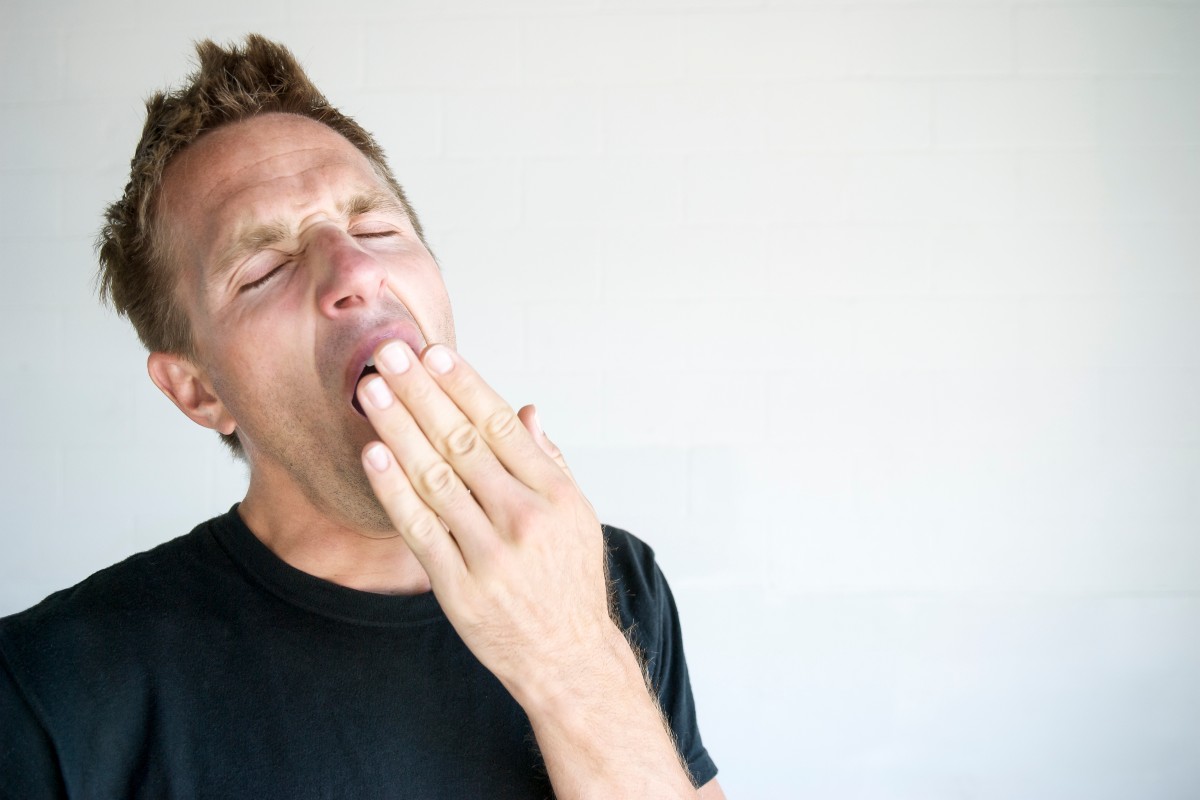
Yawning in the Most Awkward Moments
It’s happened to the best of us. Given that yawning is an involuntary action we have absolutely no control over, we’ve all been there. In fact, yawning at an inappropriate time is probably – by this point – a rite of passage!
But, on our mission to celebrate yawning and get Brits doing more of it, we decided to investigate some of the different yawning scenarios a little more in-depth. Consider the most inappropriate time you’ve found yourself yawning – or even having to stifle a yawn. Was it truly as terrible as it felt at the time? Or perhaps afterwards it seems silly that you were even embarrassed about it in the first place?
Whatever your thoughts on yawning may be, this involuntary action can creep up on the best of us at the worst of times. It happens, that’s life. Don’t beat yourself up about it. Read on to discover some of the most common, slightly awkward scenarios in which Brits have found themselves succumbing to a sneaky yawn.
Top 30 scenarios where Brits have found themselves yawning
Our survey revealed the 30 most awkward places or occasions during which the Great British public have found themselves (much to their horror) yawning. And here they are:
- During a work meeting
- While listening to a friend/relative tell a story
- On public transport
- While on a video call
- When dining out
- In church/at a religious venue
- At a party
- On a night out e.g. at a bar
- While driving
- At a funeral
- At the cinema
- At a job interview
- During a wedding ceremony
- When someone is sharing emotional news / crying
- At the theatre
- On a date
- At a concert
- In a library
- While giving a presentation
- While reading their child a bedtime story
- During a medical consultation e.g. doctors
- Watching a sports game
- During sex
- When meeting a partner’s parents
- When taking a photo/selfie
- At the dentist
- At their child’s parents evening
- At an art gallery/museum
- At the gym / fitness class
- In a courtroom
Have you also found yourself yawning during similarly seemingly awkward situations?
Why do we stifle yawns?
Stifling a yawn is primarily done due to social and cultural norms. Yawning is a natural physiological response, often linked to tiredness, boredom, or the need to regulate brain temperature. However, in many situations, yawning is perceived as impolite or inappropriate. Here are some reasons why we try to suppress yawns:
- Politeness: In social or professional settings, yawning may be interpreted as a sign of boredom or disinterest, which can be seen as disrespectful. Stifling a yawn avoids giving the impression that you’re disengaged.
- Social conformity: Suppressing a yawn helps maintain decorum in situations where overt displays of fatigue or distraction might stand out, for example in meetings, classrooms, or during formal events.
- Self-awareness: Many of us will often suppress yawns to avoid drawing attention to ourselves. This is particularly true when we feel we might disrupt others or signal weakness or tiredness.
- Contagious yawning: Yawning is contagious. And stifling a yawn might be an unconscious attempt to prevent triggering yawns in others.
- Habitual suppression: Over time, we can develop the habit of suppressing yawns as part of our normal social behaviour. This can lead to it becoming second nature to stifle our yawns in certain settings.
Although suppressing a yawn is fairly common, it’s worth noting that it can sometimes feel uncomfortable. Yawning is a natural and automatic response, not an act of rudeness.
Why is yawning seen as rude?
Yawning is often perceived as rude due to its associations and the social contexts in which it tends to happen. Here are some of the main reasons that yawning can sometimes be seen as rude:
1. Association with boredom or disinterest
Yawning is often linked to boredom. And as such, yawning can signal to others that you have no interest in what they are saying or doing. For example, let’s say you yawn during a conversation or work meeting. This could suggest that you’re not engaged, even if that’s not the case.
2. Impoliteness in formal settings
In more formal environments, yawning can sometimes be interpreted as having a lack of discipline or attentiveness. And this is especially true if the yawn is not suppressed or quickly followed up with an apology.
3. Lack of consideration for others
When someone yawns loudly or without covering their mouth, it does sometimes feel inconsiderate. The yawn could effectively disrupt the flow of a discussion or draw unnecessary attention, which some people would view as rude.
4. Historical and cultural factors
In certain cultures, yawning without covering your mouth is seen as impolite or even vulgar. Historically, we have been taught that open-mouth yawning can spread “bad air” or germs, further adding to the stigma around it (1).
5. Perceived lack of effort to hide fatigue
Yawning openly may suggest you’re too tired to fully participate or didn’t make an effort to rest ahead of the occasion or event. This is unfortunately sometimes seen as unprofessional or disrespectful in some settings.
6. Body language misinterpretation
Since human communication is heavily influenced by nonverbal cues, it’s easy to misinterpret a yawn. Even though the yawn may be involuntary, it might come across as dismissive or disengaged.
To mitigate the perception of yawning being rude, many of us will suppress or mask our yawns. This helps to signal to those around us that we have continued interest and respect and becomes especially important in social and professional interactions.
Final thoughts: Is yawning rude?
Yawning is not inherently rude. It’s actually a natural physiological response to tiredness, boredom, or the need to regulate your brain temperature. However, how and when you yawn can affect how it’s perceived.
If you find yourself in a formal or social setting needing to yawn, being discreet about it, covering your mouth, or offering a brief apology can help you maintain politeness.
Yawning helps us feel good, and so we’re encouraging people everywhere to celebrate their yawns. Spread that feel-good factor this January by joining in with our social yawning celebration.

Gemma Henry - Content Lead
Gemma finds sleep fascinating and describes the discovery aspect of her role as eye-opening. Her keen eye for detail and dedication to thorough research ensures that Bensons customers get the informative sleep-based advice they're looking for.